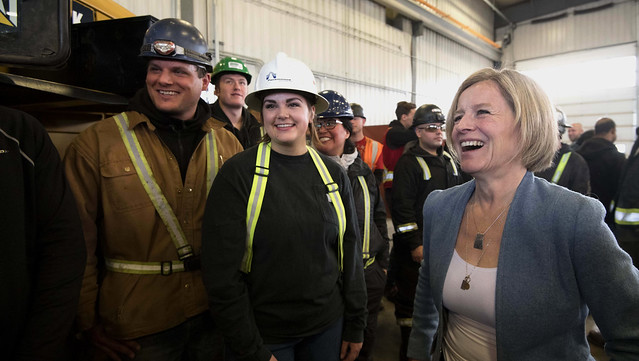This release was issued under a previous government.

Premier Notley greets local workers after announcing funding through the Made-In-Alberta energy strategy, supporting a new $2-billion petrochemicals diversification facility near Grade Prairie.
Nauticol plans to develop a $2-billion methanol plant just south of Grande Prairie. The entire project is expected to create approximately 3,000 direct and indirect jobs, including 1,000 direct construction jobs and over 200 direct permanent jobs.
“As we fight to get top dollar for the resources owned by all Albertans, Nauticol’s major investment in the Peace region means thousands of good jobs and more upgrading of our raw resources into the products the world needs right here at home. By seizing these opportunities today, we’re making sure our kids and grandkids have new opportunities in a stronger, more diversified energy sector.”
“There’s unlimited potential here in Peace Country to build on our traditional strengths in oil and gas. One year ago, we highlighted the great potential this region has for value-added upgrading, and today our Made-in-Alberta plan is getting results, creating jobs around Grande Prairie and across the province.”
The development of the project will be phased to include three identical methanol units, each capable of producing one-million metric tonnes of methanol per year. The province will support phase one with up to $80 million in future royalty credits as part of the Made-in-Alberta energy strategy. Construction of the first phase is expected to begin in 2020, with a commercial operational date set for 2022.
Methanol is a building block of countless everyday consumer and industrial products such as paints, plastics, electronics, shoes and furniture and is used widely in energy applications such as biodiesel and fuel blending, and as an alternate fuel.
“Our Made-in-Alberta for Albertans project will be Canada’s largest methanol facility. This world-scale project will expand Alberta’s petrochemical value chain by transforming the region’s abundant natural gas resources into a highly valued product that will reach growing global methanol markets. Nauticol is committed to meaningful, innovative collaborations, smart engineering and sustainable and low-cost production.”
Nauticol has a written agreement with the Western Cree Tribal Council (WCTC) member nations for potential future employment and investment opportunities. The three First Nation communities of the WCTC are Duncan’s First Nation, Horse Lake First Nation and Sturgeon Lake Cree Nation.
Quick facts
- Nauticol’s facility will be located in an existing industrial site about 10 kilometres south of the City of Grande Prairie.
- The facility will use about nine-million cubic metres (300-million cubic feet) per day of natural gas when fully operational.
- The facility will consist of three identical methanol units with a combined capacity of 3-million metric tonnes of methanol per year.
- Liquid methanol will move to North American markets and to growing Asian markets via rail and port facilities on the West Coast of British Columbia.
- Global methanol demand is growing at a rate of five per cent annually, driven by demand in China and Northeast Asia.
- Approximately 200 highly skilled, local permanent jobs and 1,000 skilled trade construction jobs will be created.
- At full build-out, approximately 1,000 upstream jobs will be created and supported as well as 1,000 downstream jobs to support facility operations.
Background
Made-in-Alberta energy strategy
- Premier Notley’s government is investing more than $3 billion to support energy diversification that creates jobs and adds value to our resources here at home.
- The focus is on two key areas: partial upgrading of our bitumen and petrochemical processing that adds value to natural gas liquids.
- Overall, this commitment is expected to attract up to $28 billion in private sector investment to Alberta and create more than 26,000 jobs.
Petrochemical upgrading
- Support for the Nauticol plant is provided under the petrochemical portion of the Made-in-Alberta strategy.
- Two projects – owned by the Canada-Kuwait Petrochemical Corporation (CKPC) and Inter Pipeline Ltd. (IPL) – were selected under the first round of this program, which was announced in 2016. The projects combined for $8 billion in private investment, creating more than 5,000 jobs.
- The government announced a second round of support for petrochemical upgrading in 2018, with total support now reaching $2.1 billion to unlock about $20 billion in private-sector investment and create more than 15,000 jobs.
- Albertans and Canadians use dozens of products every day that are based in part on petrochemicals like those from Alberta’s growing value-added industry:
- the polyester fabric on your couch, your HD television, your phone, your coffeemaker and your computer
- your car tires, engine hoses, gas, oil, radio components and seats
- your desk, chair, computer, carpet, cell phone and other office supplies
Partial upgrading of bitumen
- $1 billion in Government of Alberta grants and loan guarantees to encourage companies to invest in new or expanded bitumen-upgrading facilities
- Partial upgrading reduces the thickness of oil sands bitumen so it can flow through pipelines more easily, without having to be blended with diluent or as much diluent, a thinning agent. Benefits include:
- increased prices for our resources before shipping
- up to 30 per cent more capacity on existing pipelines
- more refineries around the world capable of processing our product
- cost savings on diluent for industry
- fewer emissions by removing high carbon content